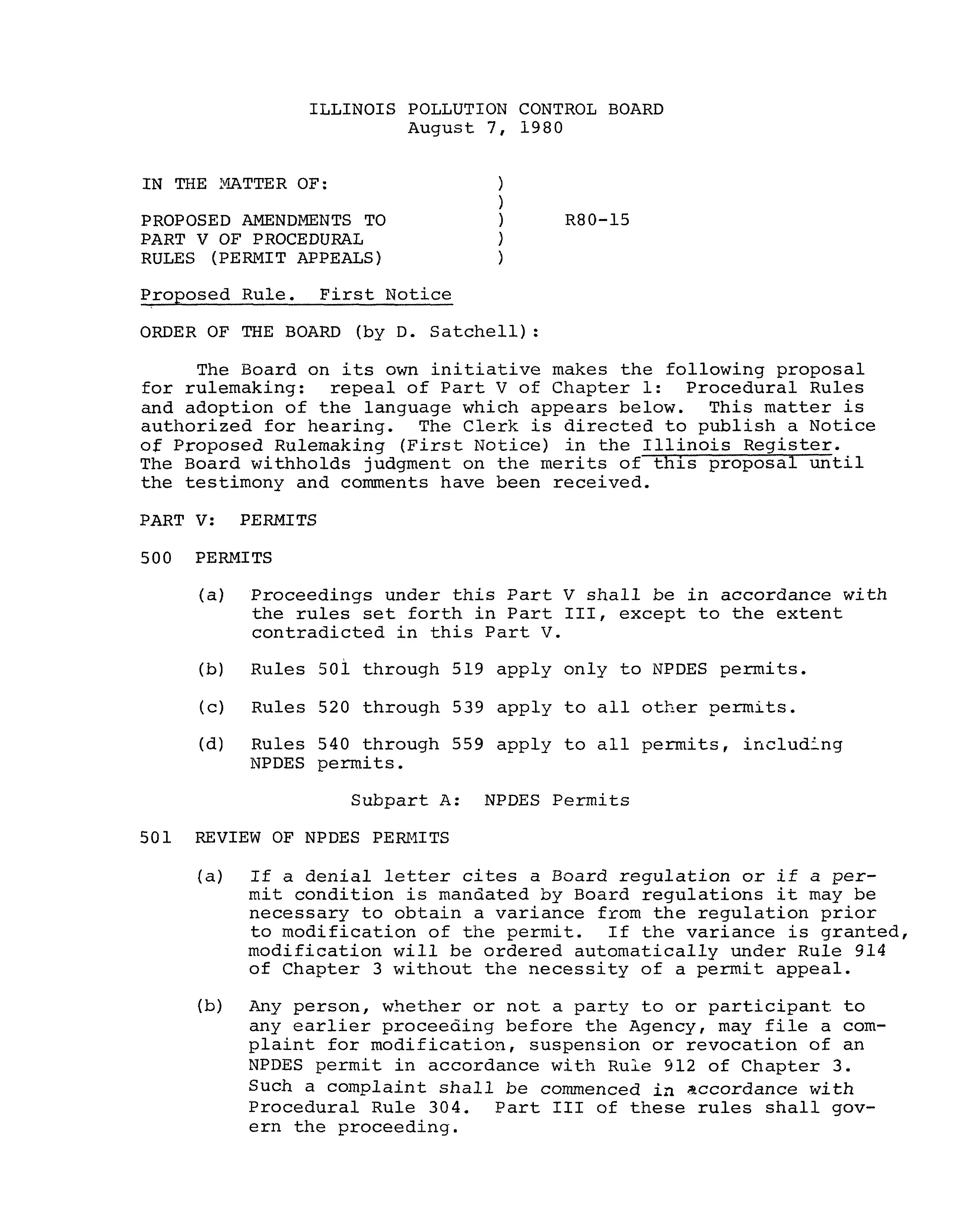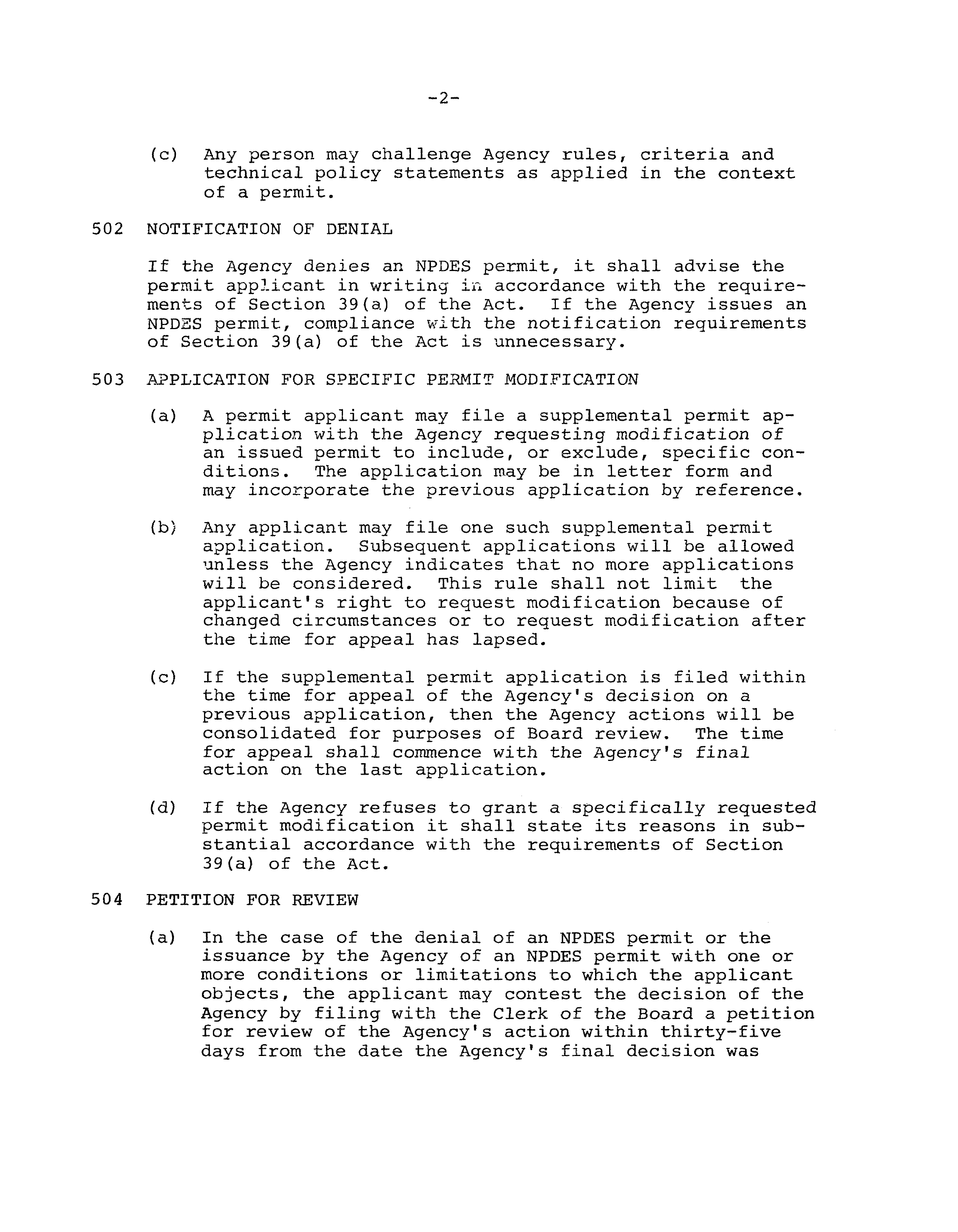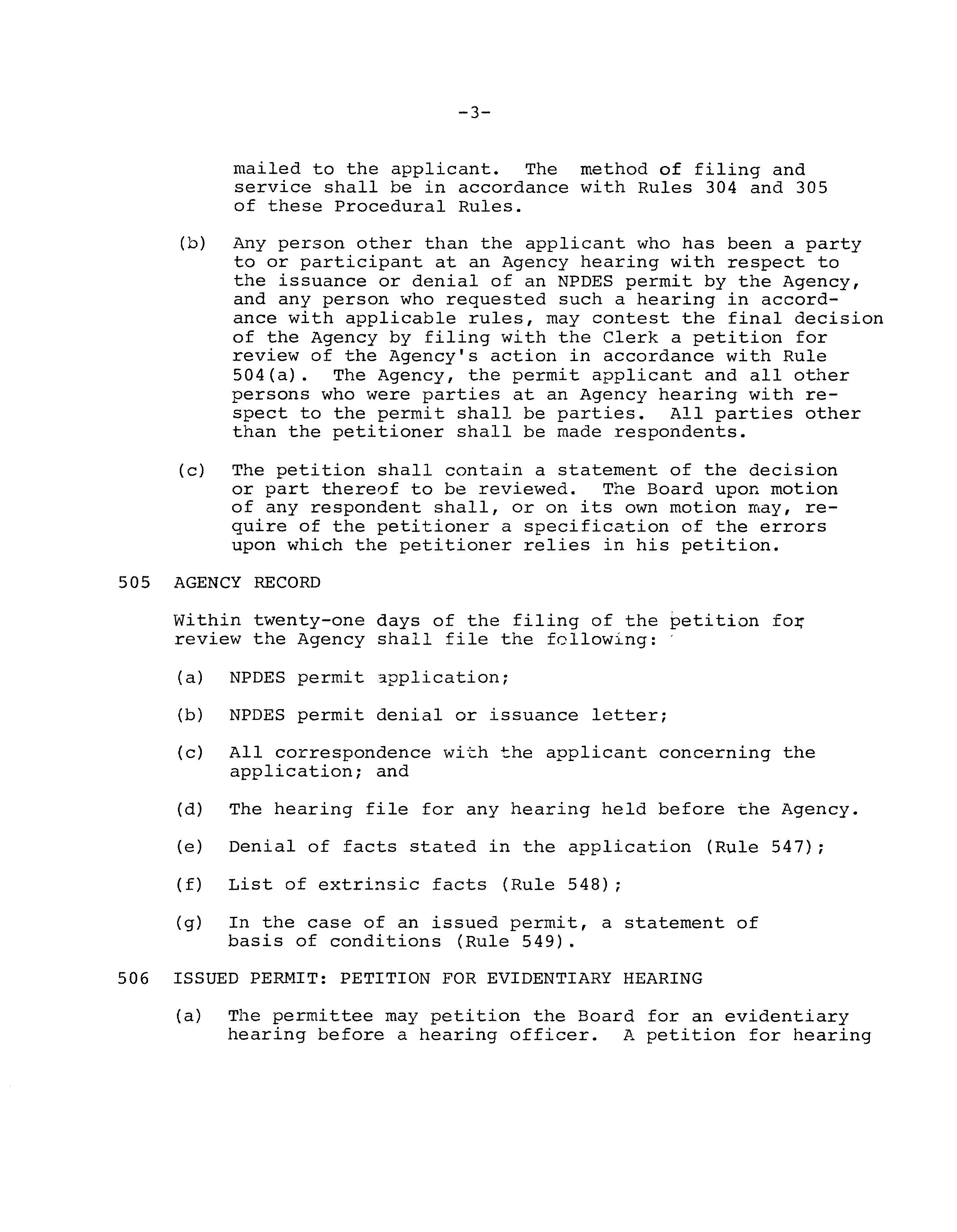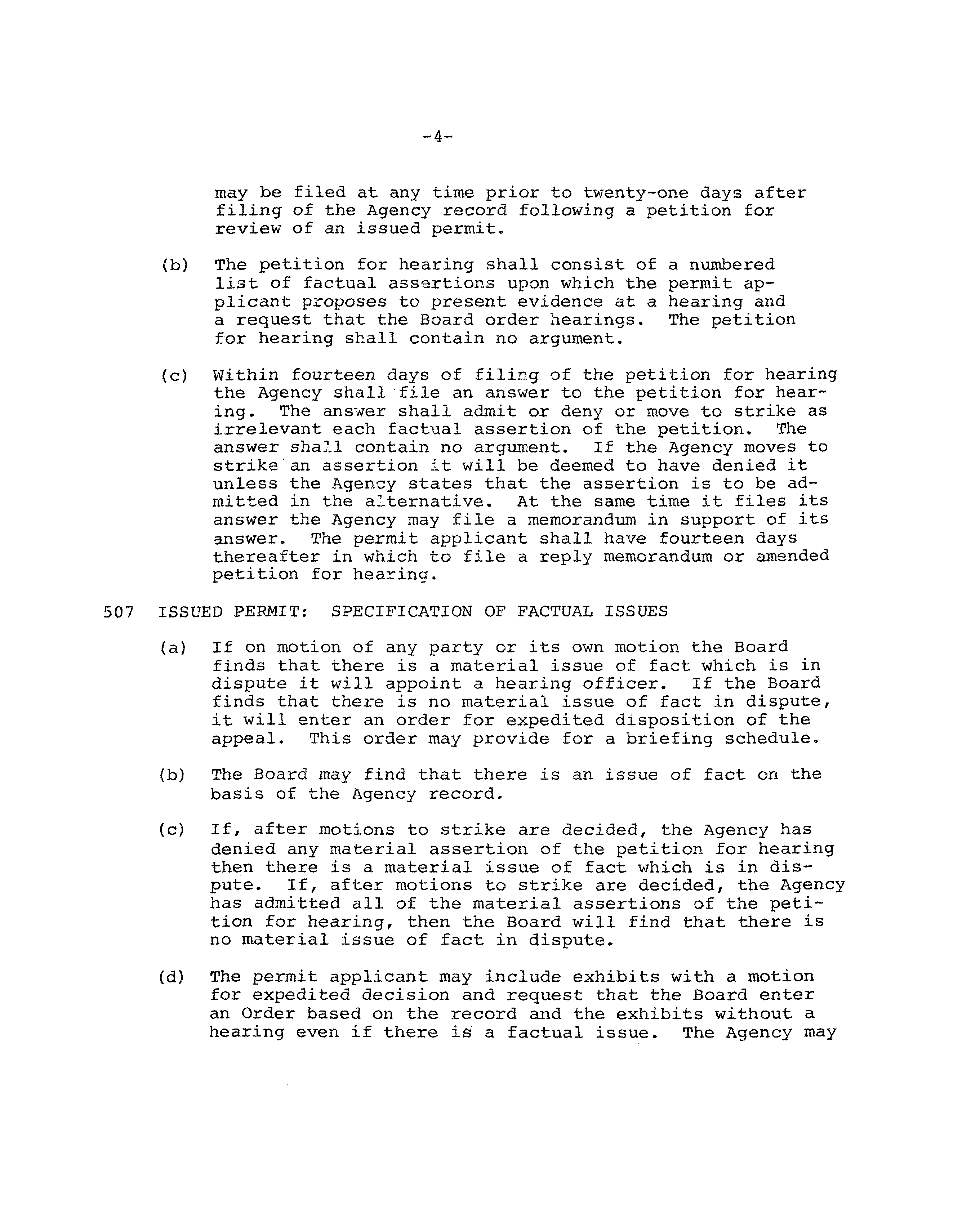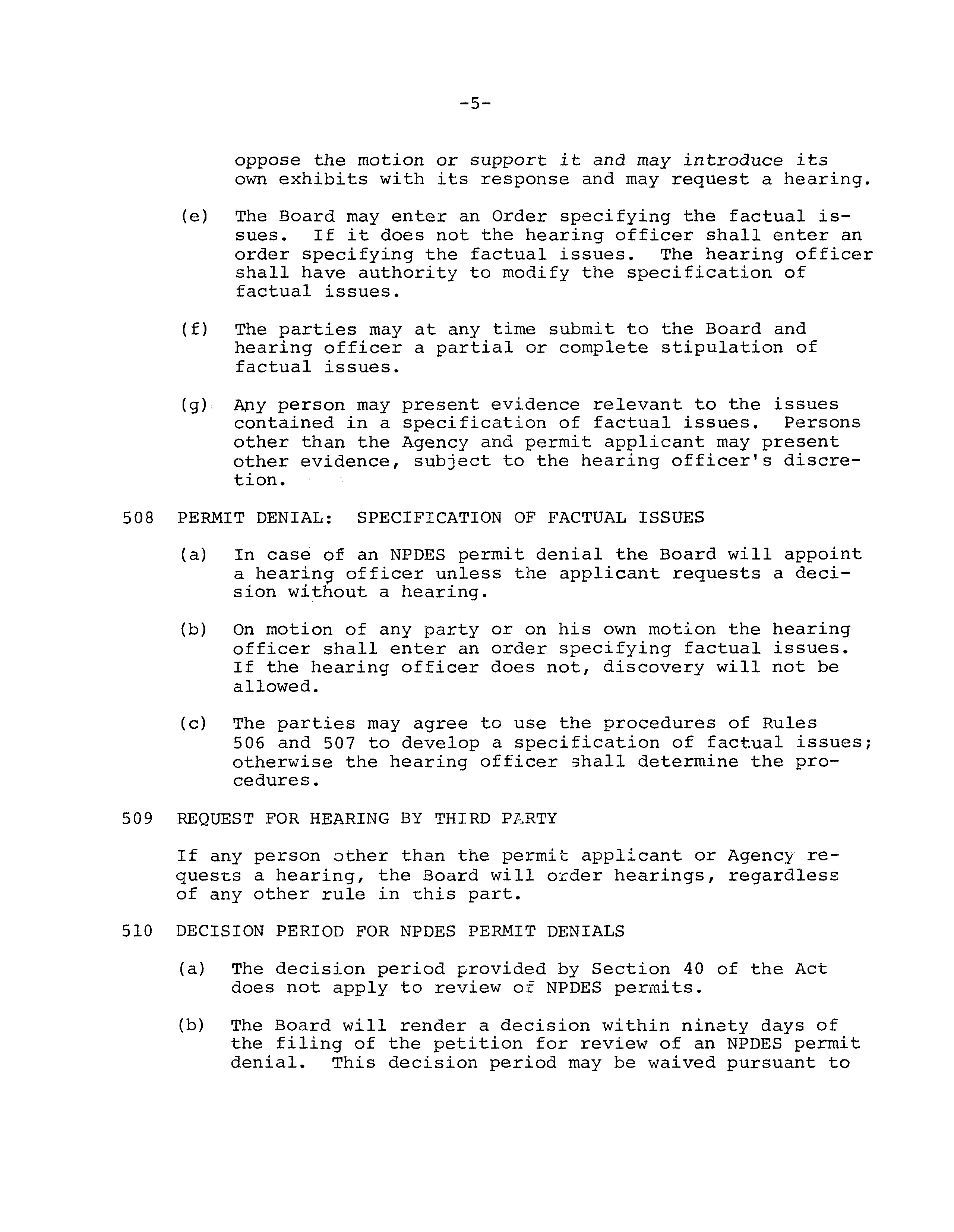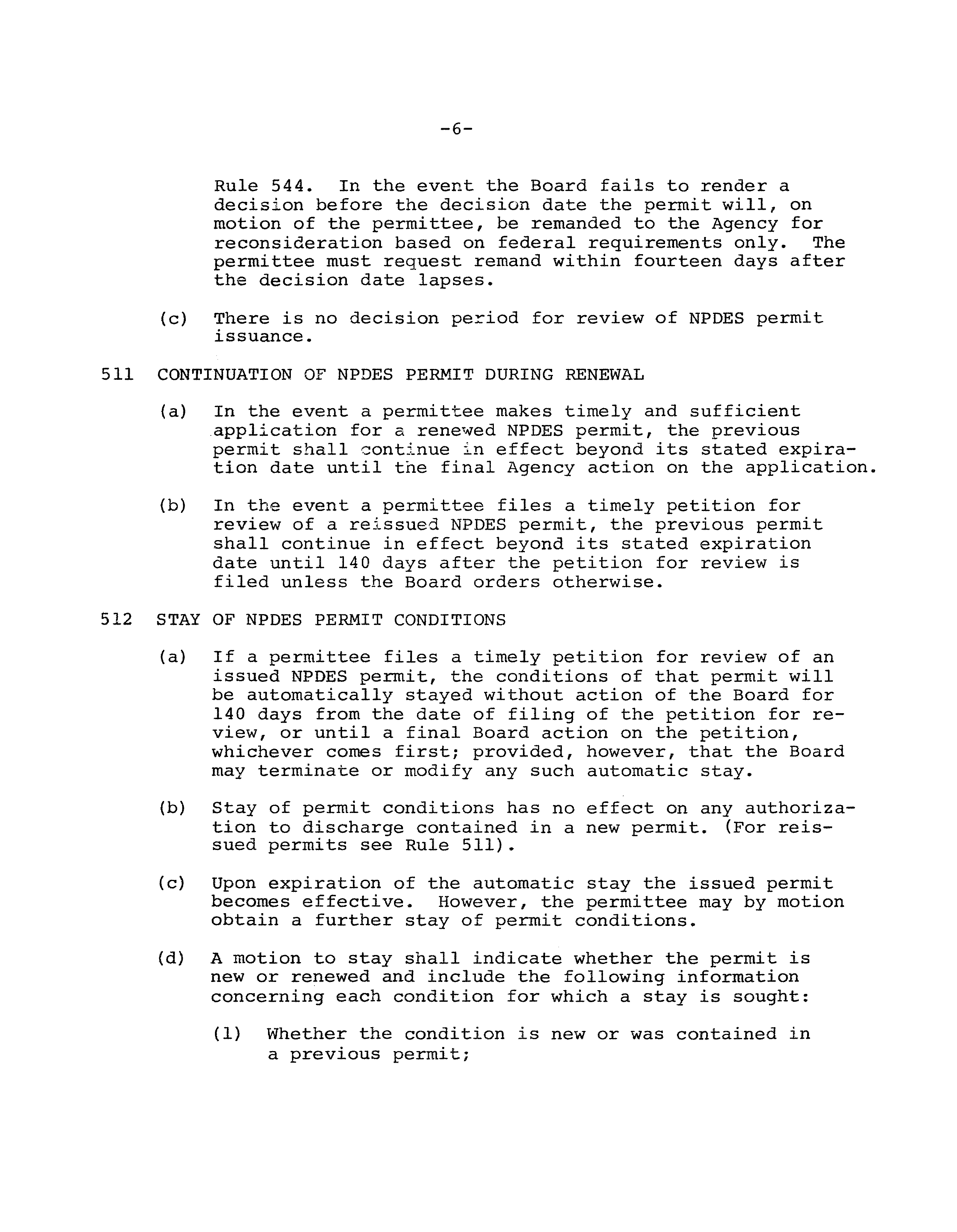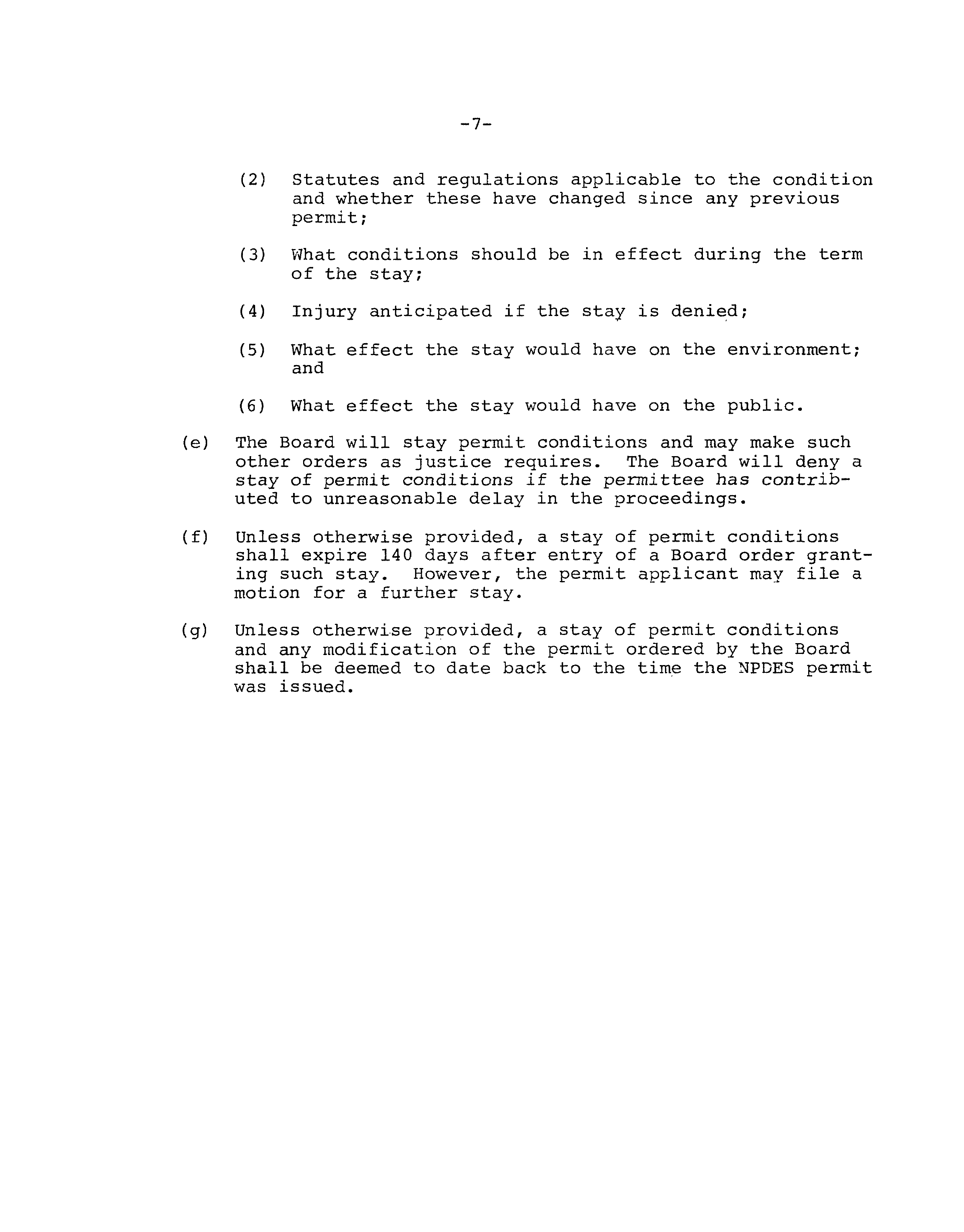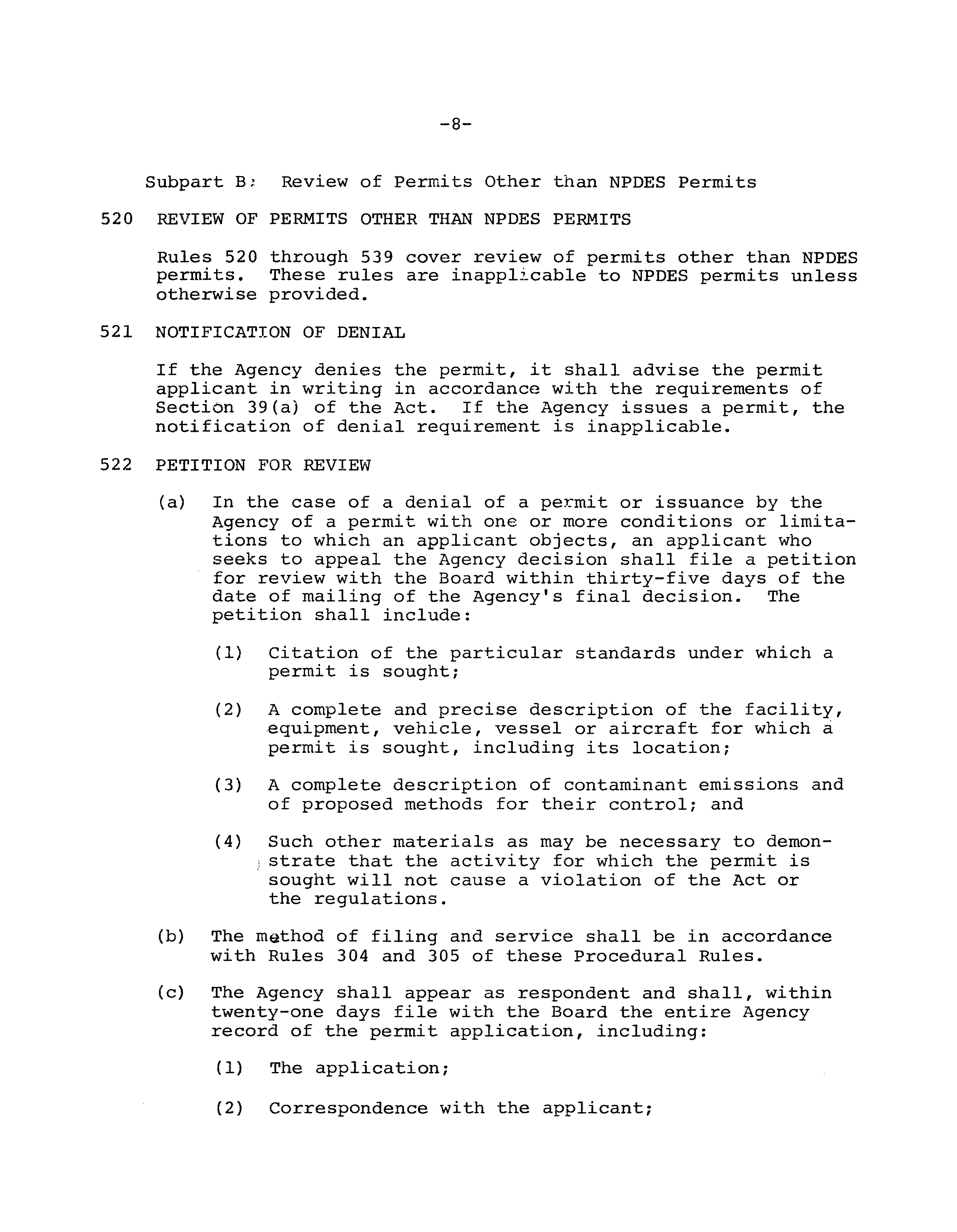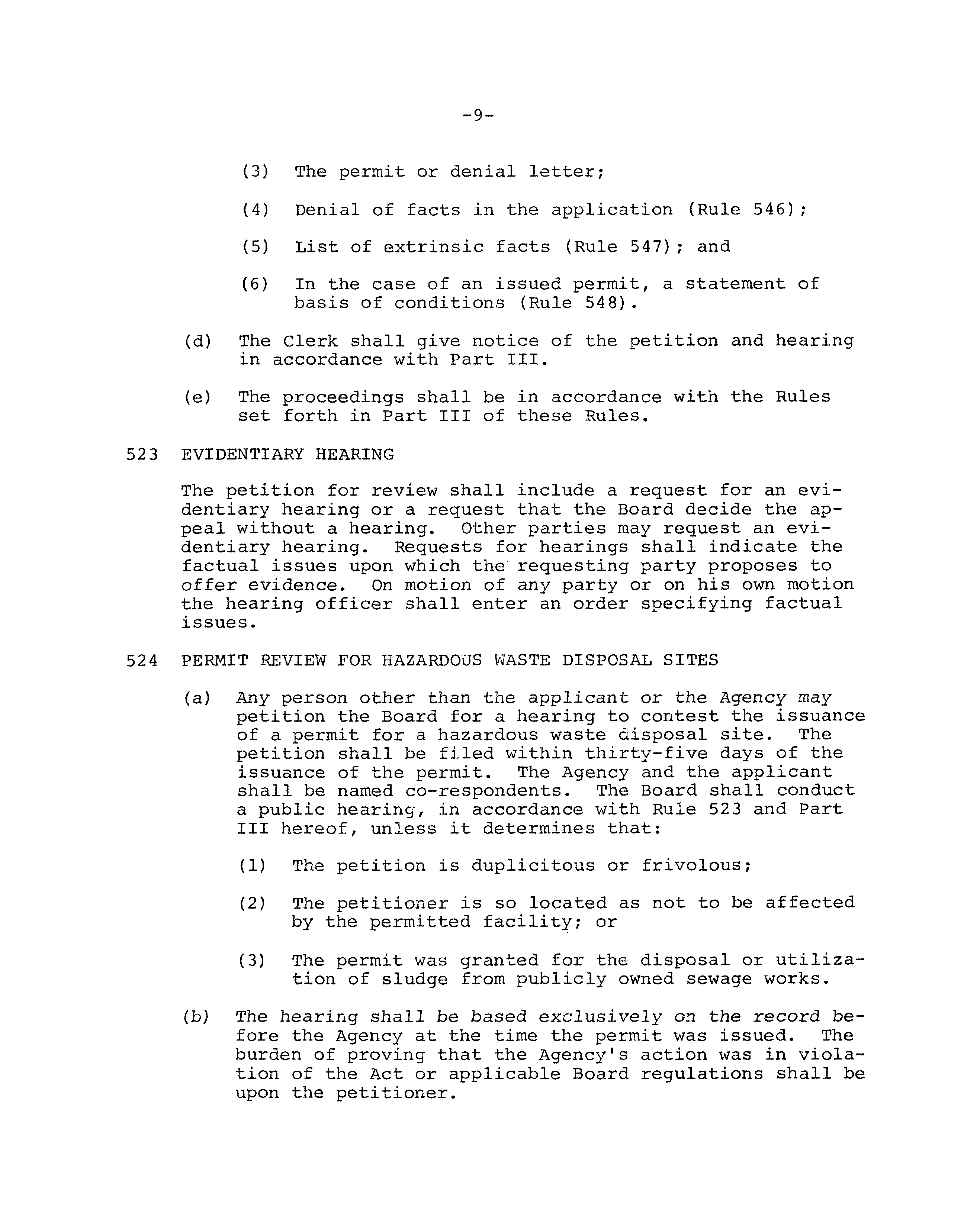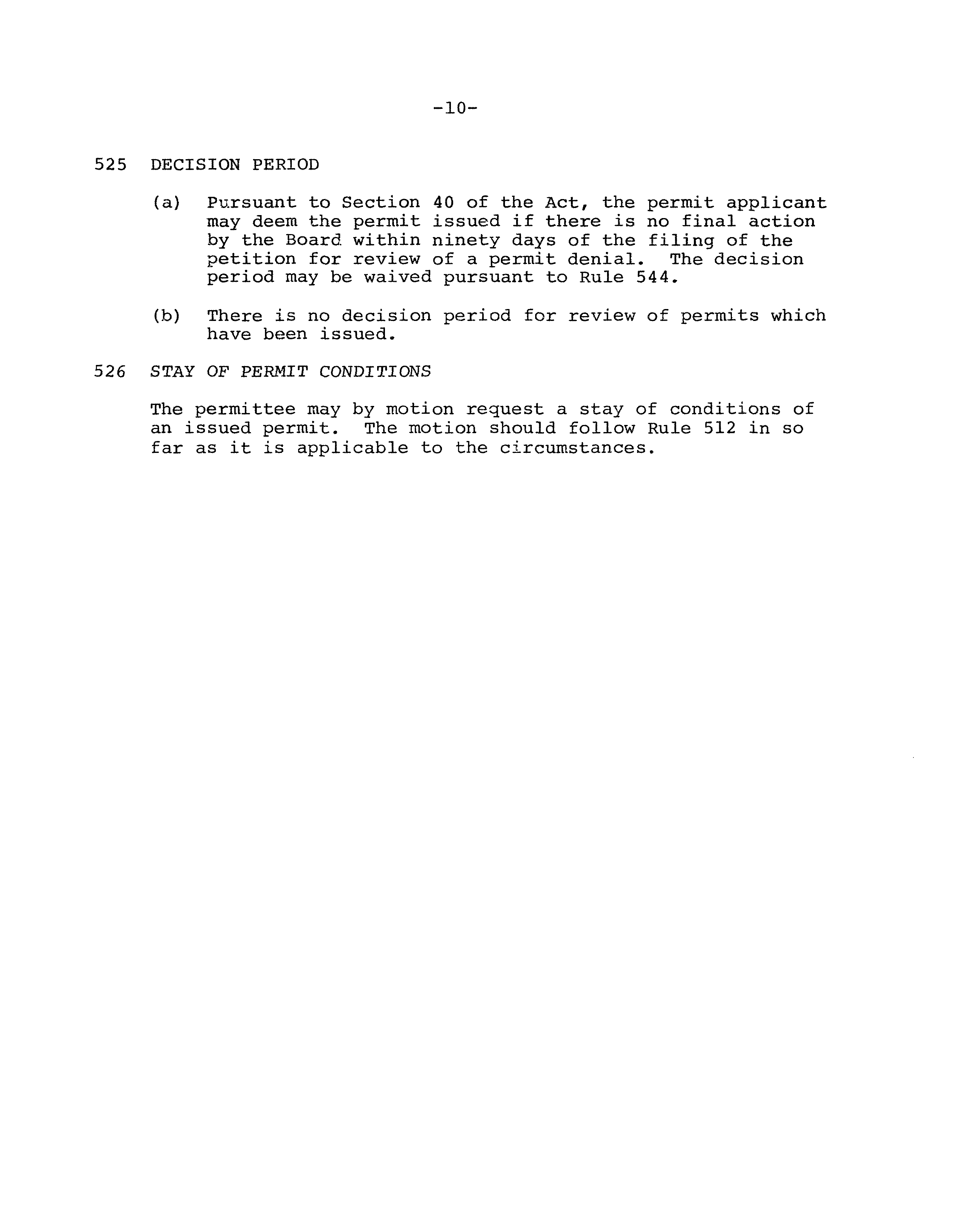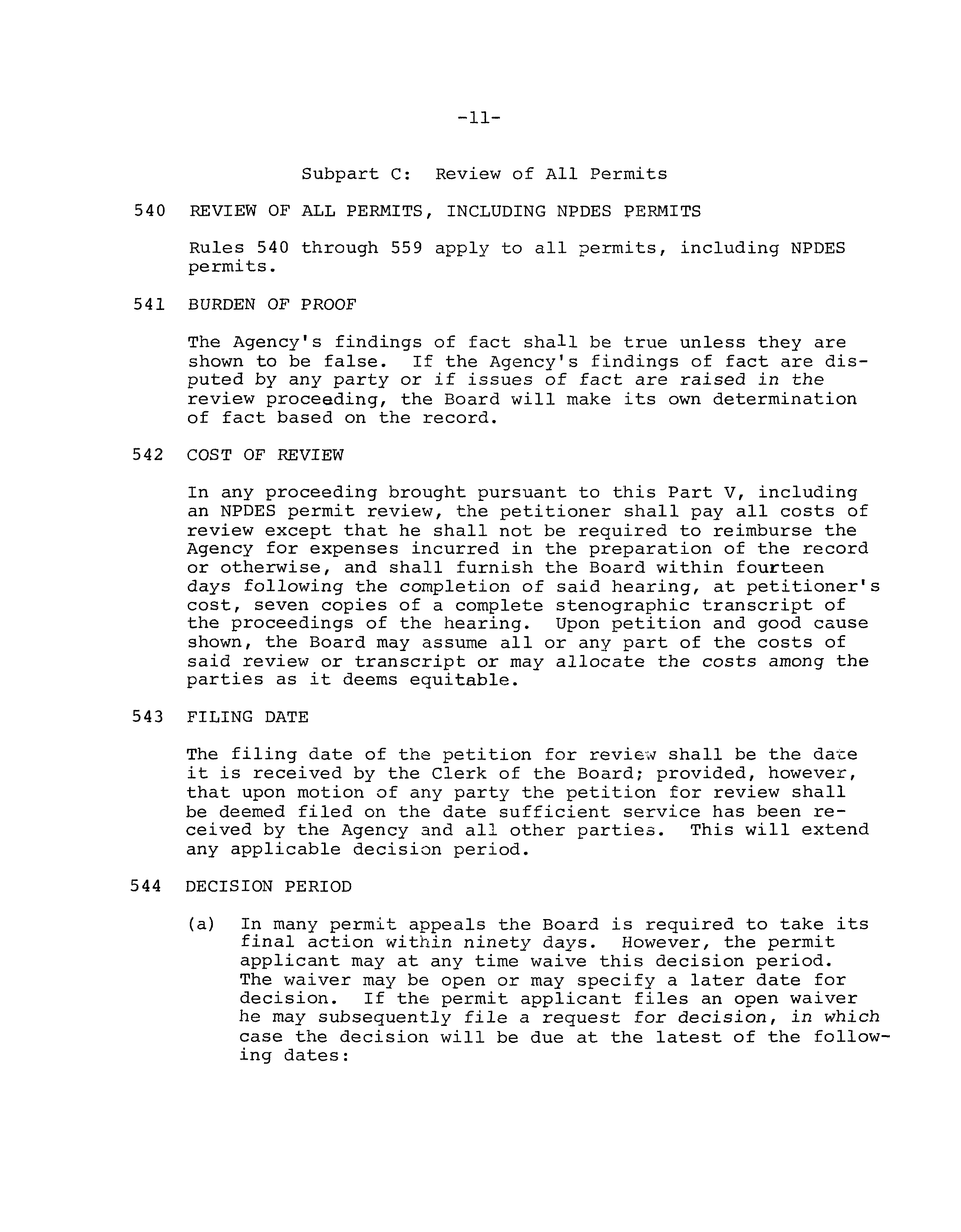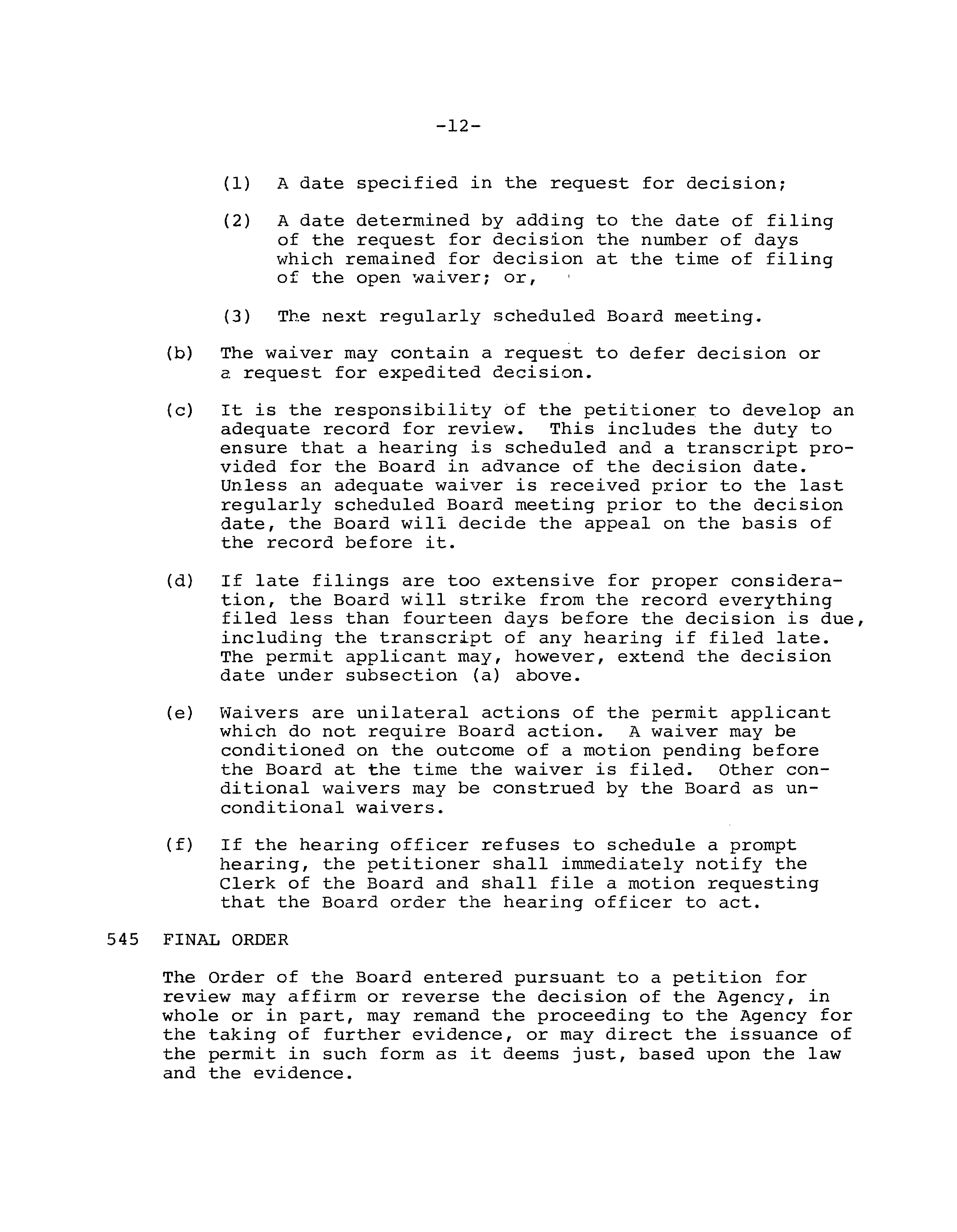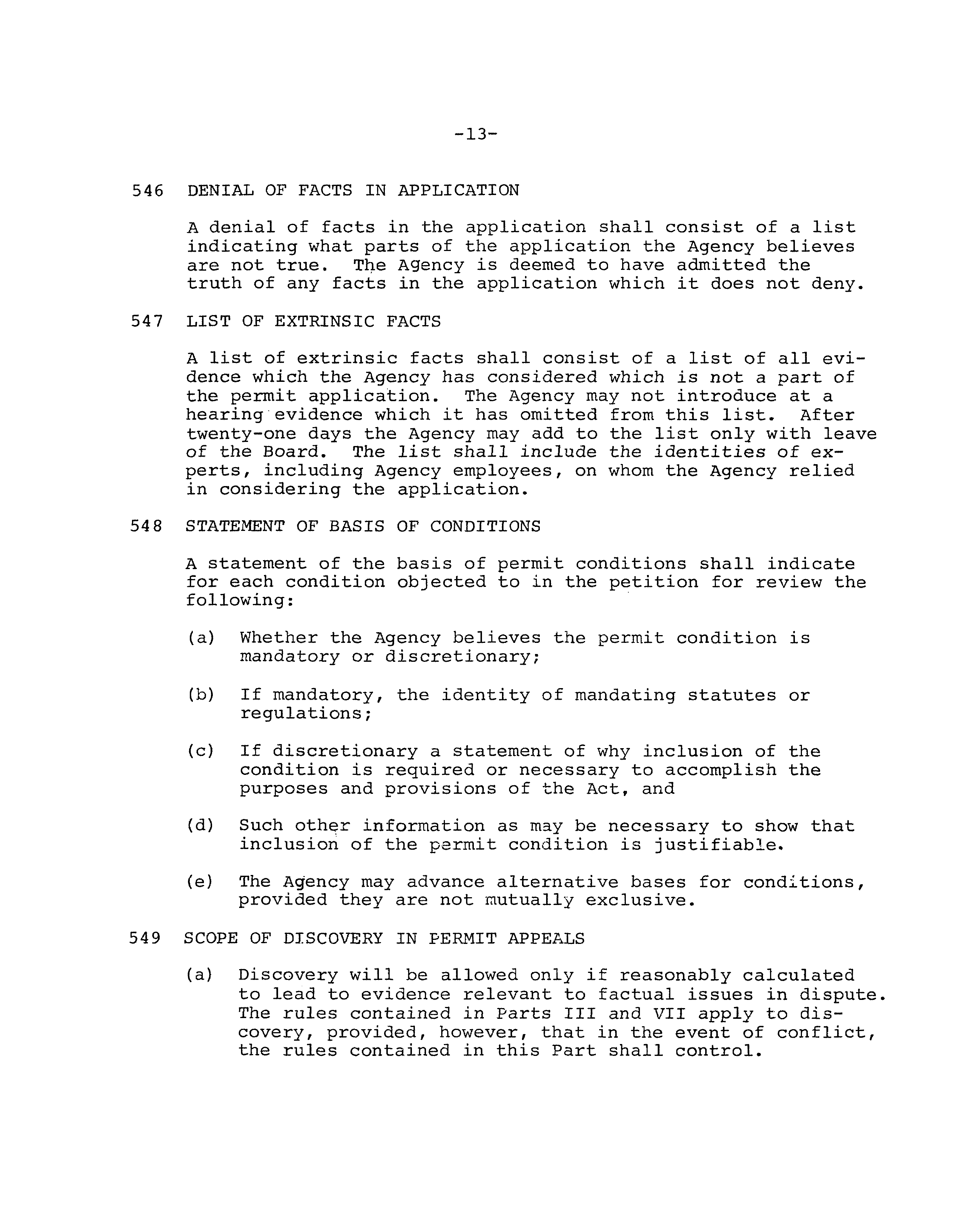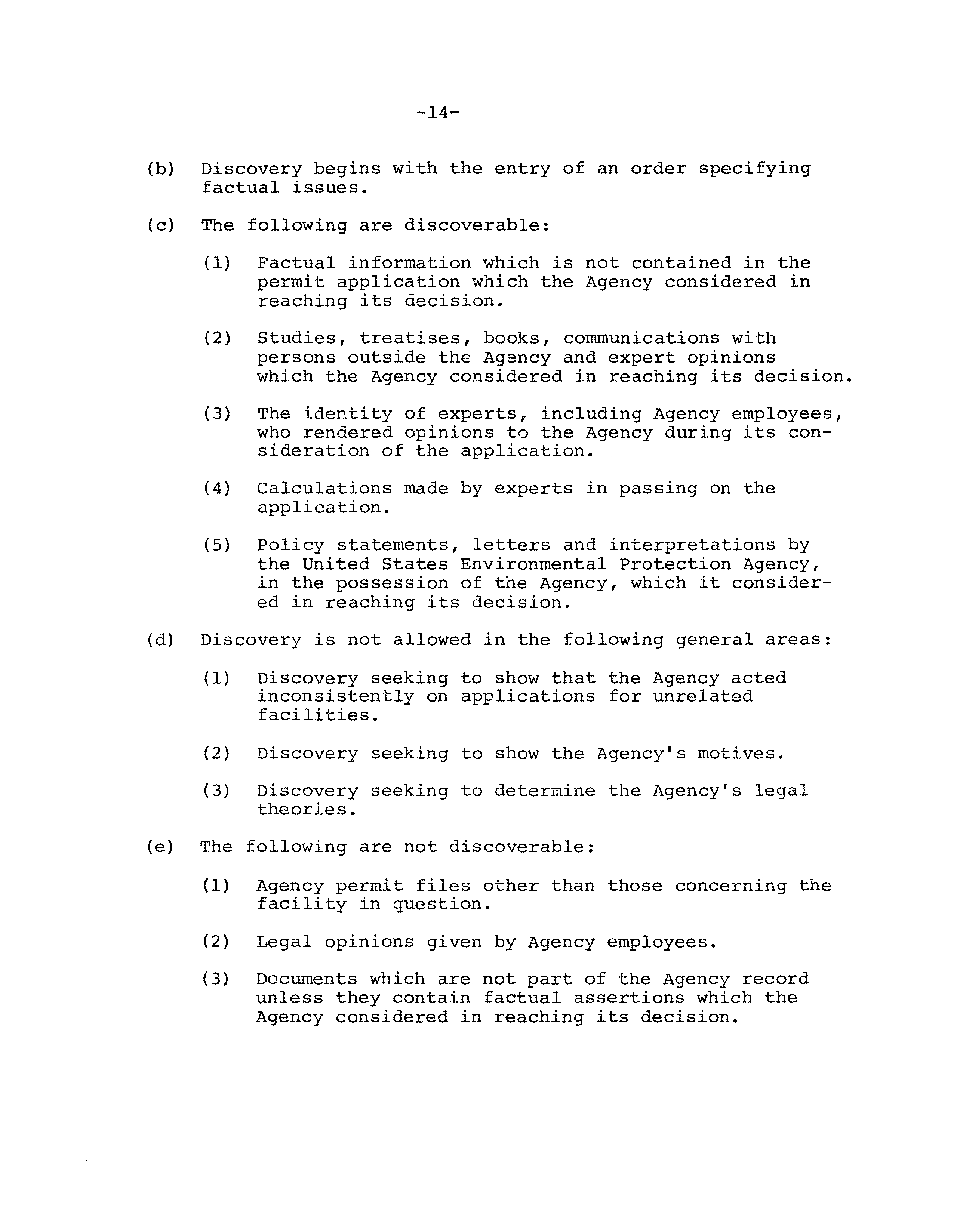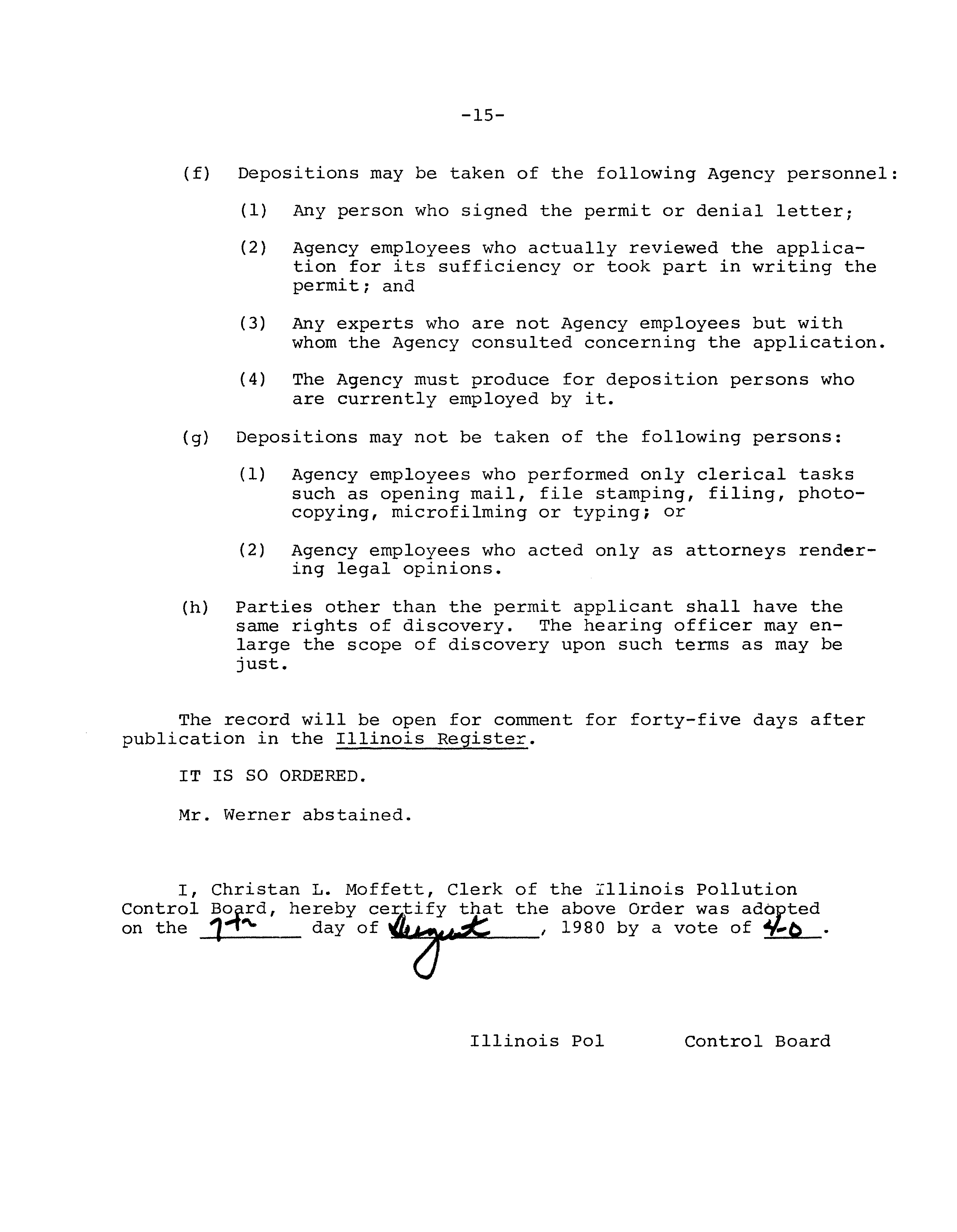ILLINOIS POLLUTION CONTROL BOARD
August
7,
1980
IN THE MATTER OF:
)
PROPOSED AMENDMENTS TO
)
R80-15
PART
V
OF PROCEDURAL
)
RULES
(PERMIT APPEALS)
)
Proposed Rule.
First Notice
ORDER OF
THE
BOARD
(by D. Satchell):
The Board on its own initiative makes the following proposal
for rulemaking:
repeal of Part V of Chapter 1:
Procedural Rules
and adoption of the language which appears below.
This matter is
authorized for hearing.
The Clerk is directed to publish a Notice
of Proposed Rulemaking (First Notice)
in the Illinois Register.
The Board withholds judgment on the merits of this proposal until
the testimony and comments have been received.
PART V:
PERMITS
500
PERMITS
(a)
Proceedings under this Part V shall be in accordance with
the rules set forth in Part III, except to the extent
contradicted in this Part V.
(b)
Rules 501 through 519 apply only to NPDES permits.
(c)
Rules 520 through 539 apply to all other permits.
(d)
Rules 540 through 559 apply to all permits, including
NPDES permits.
Subpart A:
NPDES Permits
501
REVIEW OF NPDES PERMITS
(a)
If a denial letter cites
a Board regulation or if a per-
mit condition is mandated by Board regulations
it may be
necessary to obtain a variance from the regulation prior
to modification of the permit.
If the variance
is granted,
modification will be ordered automatically under Rule 914
of Chapter
3 without the necessity of a permit appeal.
(b)
Any
person, whether or not a party to or participant to
any earlier proceeding before the Agency, may file a com-
plaint for modification, suspension or revocation of an
NPDES permit in accordance with Rule 912 of Chapter
3.
Such a complaint shall be commenced In accordance with
Procedural Rule 304.
Part III of these rules
shall gov-
ern the proceeding.
—2—
(c)
Any
person may challenge Agency rules, criteria and
technical policy statements as applied in the context
of a permit.
502
NOTIFICATION OF DENIAL
If the Agency denies an NPDES permit,
it shall advise the
permit applicant in writing
in
accordance with the require-
ments of Section
39(a)
of the Act.
If the Agency issues
an
NPDES permit, compliance with the notification requirements
of Section 39(a)
of the Act
is unnecessary.
503
APPLICATION FOR SPECIFIC PERMIT MODIFICATION
(a)
A permit applicant may file a supplemental permit ap-
plication with the Agency requesting modification of
an issued permit to include,
or exclude,
specific con-
ditions.
The application may be in letter form and
may incorporate the previous application by reference.
(b)
Any applicant may file one such supplemental permit
application.
Subsequent applications will be allowed
unless the Agency indicates that no more applications
will be considered.
This rule shall not limit
the
applicant’s right to request modification because of
changed circumstances or to request modification after
the time for appeal has lapsed.
(c)
If the supplemental permit application is filed within
the time for appeal of the Agency’s decision on a
previous application, then the Agency actions will be
consolidated for purposes of Board review.
The time
for appeal shall commence with the Agency’s final
action on the last application.
(d)
If the Agency refuses to grant a specifically requested
permit modification it shall state its reasons in sub-
stantial accordance with the requirements of Section
39(a)
of the Act.
504
PETITION FOR
REVIEW
(a)
In the case of the denial of an NPDES permit or the
issuance by the Agency of an NPDES permit with one or
more conditions or limitations to which the applicant
objects,
the applicant may contest the decision of the
Agency by filing with the Clerk of the Board a petition
for review of the Agency’s action within thirty-five
days from the date the Agency’s
final decision was
—3—
mailed to the applicant.
The
method of filing and
service shall be in accordance with Rules
304 and 305
of these Procedural Rules.
(b)
Any person other than the applicant who has been
a party
to or participant at an Agency hearing with respect to
the issuance or denial of an NPDES permit by the Agency,
and any person who requested such a hearing in accord-
ance with applicable rules, may contest the final decision
of the Agency by filing with the Clerk a petition for
review of the Agency’s action in accordance with Rule
504(a).
The Agency,
the permit applicant and all other
persons who were parties at an Agency hearing with re-
spect to the permit shall be parties.
All parties other
than the petitioner shall be made respondents.
(c)
The petition shall contain a statement of the decision
or part thereof to be reviewed.
The Board upon motion
of any respondent shall, or on its own motion may, re-
quire of the petitioner a specification of the errors
upon which the petitioner relies
in his petition.
505
AGENCY
RECORD
Within twenty-one days of the filing of the petition for
review the Agency shall
file the following:
(a)
NPDES permit application;
(b)
NPDES permit denial or issuance letter;
(c)
All correspondence with the applicant concerning the
application; and
(d)
The hearing file for any hearing held before the Agency.
(e)
Denial of facts stated in the application
(Rule 547);
(f)
List of extrinsic facts
(Rule
548)
(g)
In the case of an issued permit,
a statement of
basis of conditions
(Rule
549)
506
ISSUED PERMIT: PETITION FOR EVIDENTIARY HEARING
(a)
The permittee may petition the Board for an evidentiary
hearing before a hearing officer.
A petition for hearing
*4*
may be filed at any time prior to twenty-one days after
filing of the Agency record following a petition for
review of an issued permit.
(b)
The petition for hearing shall consist of a numbered
list of factual assertions upon which the permit ap-
plicant proposes to present evidence at a hearing and
a request that the Board order hearings.
The petition
for hearing shall contain no argument.
(c)
Within fourteen days of filing of the petition for hearing
the Agency shall file an answer to the petition for hear-
ing.
The answer shall admit or deny or move to strike as
irrelevant each factual assertion of the petition.
The
answer shall contain no argument.
If the Agency moves to
strike an assertion
it will be deemed to have denied it
unless the Agency states that the assertion is to be ad-
mitted in the aternative.
At the same time it files its
answer the Agency may file
a memorandum in support of its
answer.
The permit applicant shall have fourteen days
thereafter in which to file
a reply memorandum or amended
petition for hearing.
507
ISSUED PERMIT:
SPECIFICATION OF FACTUAL ISSUES
(a)
If on motion of any party or its own motion the Board
finds that there is a material issue of fact which is in
dispute it will appoint a hearing officer.
If the Board
finds that there
is no material issue of fact in dispute,
it will enter an order for expedited disposition of the
appeal.
This order may provide for a briefing schedule.
(b)
The Board may find that there
is an issue of fact on the
basis of the Agency record.
(c)
If, after motions to strike are decided,
the Agency has
denied any material assertion of the petition for hearing
then there
is a material issue of fact which is
in dis-
pute.
If,
after motions to strike are decided,
the Agency
has admitted all of the material assertions of the peti-
tion for hearing, then the Board will find that there
is
no material issue of fact in dispute.
Cd)
The permit applicant may include exhibits with a motion
for expedited decision and request that the Board enter
an Order based on the record and the exhibits without a
hearing even if there
i~
a factual issue.
The Agency may
—5—
oppose
the motion or support it and may introduce
its
own exhibits with its response and may request a hearing.
(e)
The Board may enter an Order specifying the factual is-
sues.
If it does not the hearing officer shall enter an
order specifying the factual issues.
The hearing officer
shall have authority to modify the specification of
factual issues.
(f)
The parties may at any time submit to the Board and
hearing officer a partial or complete stipulation of
factual issues.
(g)
A~iy
person may present evidence relevant to the issues
contained in a specification of factual issues.
Persons
other than the Agency and permit applicant may present
other evidence, subject to the hearing officer’s discre-
tion.
508
PERMIT DENIAL:
SPECIFICATION OF FACTUAL ISSUES
(a)
In case of an NPDES permit denial the Board will appoint
a hearing officer unless the applicant requests a deci-
sion without a hearing.
(b)
On motion of any party or on his own motion the hearing
officer shall enter an order specifying factual issues.
If the hearing officer does not, discovery will not be
allowed.
(c)
The parties may agree
to use the procedures of Rules
506 and 507 to develop a specification of factual issues;
otherwise the hearing officer 3hall determine the pro-
cedures.
509
REQUEST
FOR
HEARING
BY
THIRD
PARTY
If
any
person other than the
permit
applicant
or
Agency re-
quests
a hearing,
the Board will order hearings,
regardless
of any other rule in this part.
510
DECISION PERIOD FOR NPDES PERMIT DENIALS
(a)
The decision period provided by Section 40 of the Act
does not apply to review of NPDES permits.
(b)
The Board will render a decision within ninety days of
the filing of the petition for review of an NPDES permit
denial.
This decision period may be waived pursuant to
—6—
Rule 544.
In the event the Board fails to render a
decision before the decision date the permit will,
on
motion of the permittee,
be remanded to the Agency for
reconsideration based on federal requirements only.
The
permittee must request remand within fourteen days after
the decision date
lapses.
(c)
There
is no decision period for review of NPDES permit
issuance.
511
CONTINUATION OF NPDES PERMIT DURING RENEWAL
(a)
In the event a permittee makes timely and sufficient
application for a renewed NPDES permit,
the previous
permit shall continue
in effect beyond its stated expira-
tion date until the final Agency action on the application.
(b)
In the event a permittee files
a timely petition for
review of a reissued NPDES permit,
the previous permit
shall continue in effect beyond its stated expiration
date until
140 days after the petition for review is
filed unless the Board orders otherwise.
512
STAY OF NPDES PERMIT CONDITIONS
(a)
If a permittee files a timely petition for review of an
issued NPDES permit,
the conditions of that permit will
be automatically stayed without action of the Board for
140 days from the date of filing of the petition for re-
view,
or until a final Board action on the petition,
whichever comes
first;
provided, however, that the Board
may terminate or modify any such automatic stay.
(b)
Stay of permit conditions has no effect on any authoriza-
tion to discharge contained in a new permit.
(For reis-
sued permits see Rule 511).
(c)
Upon expiration of the automatic stay the issued permit
becomes effective.
However, the permittee may by motion
obtain
a further stay of permit conditions.
(d)
A motion to stay shall indicate whether the permit is
new or renewed
and
include the following information
concerning each condition for which a stay is sought:
(1)
Whether the condition is new or was contained in
a previous permit;
—7—
(2)
Statutes and regulations applicable to the condition
and
whether
these
have
changed
since
any
previous
permit;
(3)
What conditions should be in effect during the term
of
the
stay;
(4)
Injury anticipated if the stay is denied;
(5)
What effect the stay would have on the environment;
and
(6)
What effect the stay would have on the public.
(e)
The
Board
will
stay
permit
conditions
and
may
make
such
other orders
as justice requires.
The Board will deny a
stay of permit conditions
if the permittee has contrib-
uted to unreasonable delay in the proceedings.
(f)
Unless otherwise provided,
a stay of permit conditions
shall expire
140 days after entry of
a Board order grant-
ing such stay.
However,
the permit applicant may file
a
motion for a further stay.
(g)
Unless
otherwi.se
provided,
a
stay
of
permit
conditions
and
any
modification
of
the
permit
ordered
by
the
Board
shall
be
deemed
to
date
back
to
the
time
the
NPDES
permit
was
issued.
—8—
Subpart
B~
Review
of
Permits
Other
than
NPDES
Permits
520
REVIEW
OF
PERMITS
OTHER
THAN
NPDES
PERMITS
Rules
520
through
539
cover
review
of
permits
other
than
NPDES
permits.
These
rules
are
inapplicable
to
NPDES
permits
unless
otherwise provided.
521
NOTIFICATION
OF
DENIAL
If the Agency denies the permit,
it shall advise the permit
applicant
in
writing
in
accordance
with
the
requirements
of
Section
39(a)
of
the
Act.
If
the Agency issues a permit, the
notification
of
denial
requirement
is
inapplicable.
522
PETITION
FOR
REVIEW
(a)
In
the
case
of
a
denial of a permit or issuance by the
Agency
of
a
permit
with
one
or
more
conditions
or
limita-
tions to which an applicant objects,
an applicant who
seeks to appeal the Agency decision shall file a petition
for review with the Board within thirty-five days of the
date of mailing of the Agency’s final decision.
The
petition
shall
include:
(1)
Citation
of
the
particular
standards
under
which
a
permit is sought;
(2)
A
complete
and
precise
description
of
the
facility,
equipment,
vehicle,
vessel
or
aircraft
for
which
a
permit is sought, including its location;
(3)
A
complete
description
of
contaminant
emissions
and
of proposed methods for their control;
and
(4)
Such other materials as may be necessary to demon-
strate that the activity for which the permit is
sought
will
not
cause
a
violation
of
the
Act
or
the
regulations.
(b)
The
method
of
filing
and
service
shall
be
in
accordance
with
Rules
304
and
305
of
these
Procedural
Rules.
Cc)
The
Agency
shall
appear
as
respondent
and
shall,
within
twenty-one
days
file
with
the
Board
the
entire
Agency
record
of
the
permit
application,
including:
(1)
The
application;
(2)
Correspondence
with
the
applicant;
—9—
(3)
The
permit
or
denial
letter;
(4)
Denial of facts
in the application
(Rule 546)
(5)
List of extrinsic facts
(Rule 547)
; and
(6)
In the case of an issued permit,
a statement of
basis of conditions
(Rule
548).
Cd)
The Clerk shall give notice of the petition and hearing
in accordance with Part III.
(e)
The proceedings
shall be in accordance with the Rules
set forth in Part III of these Rules.
523
EVIDENTIARY HEARING
The petition for review shall include
a request for an evi-
dentiary hearing or a request that the Board decide the ap-
peal without a hearing.
Other parties may request an evi-
dentiary hearing.
Requests for hearings shall indicate the
factual issues upon which the requesting party proposes to
offer evidence.
On motion of any party or on his
own
motion
the hearing officer shall enter an order specifying factual
issues.
524
PERMIT REVIEW FOR HAZARDOUS WASTE DISPOSAL SITES
(a)
Any person other than the applicant or the Agency may
petition the Board for a hearing to contest the issuance
of a permit for
a hazardous waste disposal site.
The
petition shall be filed within thirty-five days of the
issuance of the permit.
The Agency and the applicant
shall be named co—respondents.
The Board shall conduct
a public hearing,
in accordance with Rule 523 and Part
III hereof, unless it determines that:
(1)
The
petition
is
duplicitous
or
frivolous;
(2)
The
petitioner
is
so
located
as
not
to
be
affected
by
the
permitted
facility;
or
(3)
The
permit
was
granted
for
the
disposal
or
utiliza-
tion of sludge from publicly owned sewage works.
(b)
The hearing shall be based exclusively
on
the record be-
fore the Agency at the time the permit was issued.
The
burden of proving that the Agency’s action was in viola-
tion of the Act or applicable Board regulations shall be
upon the petitioner.
—10—
525
DECISION
PERIOD
(a)
Pursuant
to
Section
40
of
the
Act,
the
permit
applicant
may
deem
the
permit
issued
if
there
is
no
final
action
by
the
Board
within
ninety
days
of
the
filing
of
the
petition for review of a permit denial.
The decision
period
may
be
waived
pursuant
to
Rule
544.
(h)
There is no decision period for review of permits which
have
been
issued.
526
STAY
OF
PERMIT
CONDITIONS
The permittee may by motion request a stay of conditions
of
an issued permit.
The motion should follow Rule 512 in so
far
as
it
is
applicable
to
the
circumstances.
—11—
Subpart C:
Review of All Permits
540
REVIEW
OF ALL PERMITS,
INCLUDING NPDES
PERMITS
Rules 540 through 559 apply to all permits,
including NPDES
permits.
541
BURDEN
OF
PROOF
The Agency’s findings of fact shall be true unless they are
shown to be false.
If the Agency’s findings of fact are dis-
puted by any party or if issues of fact are raised in the
review proceeding, the Board will make its own determination
of fact based on the record.
542
COST OF REVIEW
In any proceeding brought pursuant to this Part V1 including
an NPDES permit review, the petitioner shall pay all costs
of
review except that he shall not be required to reimburse the
Agency for expenses incurred in the preparation of the record
or otherwise,
and shall furnish
the
Board within fourteen
days following the completion of said hearing,
at petitioner’s
cost,
seven copies of a complete stenographic transcript of
the proceedings of the hearing.
Upon petition and good cause
shown,
the Board may assume all or any part of the costs of
said review or transcript or may allocate the costs among the
parties as it deems equitable.
543
FILING DATE
The filing date of the petition for review shall be the date
it is received by the Clerk of the Board; provided, however,
that upon motion of any party the petition for review shall
be deemed filed on the date sufficient service has been re-
ceived by the Agency and all other parties.
This will extend
any applicable decision period.
544
DECISION
PERIOD
(a)
In many permit appeals the Board is required to take its
final action within ninety days.
However,
the permit
applicant may at any time waive this decision period.
The waiver may be open or may specify a later date for
decision.
If the permit applicant files
an open waiver
he may subsequently file
a request for decision,
in which
case the decision will be due at the latest of the follow-
ing dates:
—12—
(1)
A
date
specified
in
the
request
for
decision;
(2)
A date determined by adding to the date of filing
of the request for decision the number
of
days
which remained for decision at the time of filing
of the open waiver;
or,
(3)
The
next
regularly
scheduled
Board
meeting.
(b)
The
waiver
may
contain
a
request
to
defer
decision
or
a request for expedited decision.
(c)
It
is
the
responsibility
of
the
petitioner
to
develop
an
adequate
record
for
review.
This
includes
the
duty
to
ensure that a hearing
is scheduled and a transcript pro-
vided for the Board in advance of the decision date.
Unless an adequate waiver is received prior to the last
regularly scheduled Board meeting prior to the decision
date,
the Board will decide the appeal on the basis of
the record before it.
(d)
If late filings are too extensive for proper considera-
tion,
the Board will strike from the record everything
filed less than fourteen days before the decision is due,
including
the
transcript
of
any
hearing
if
filed
late.
The permit applicant may, however, extend the decision
date under subsection
(a)
above.
(e)
Waivers
are
unilateral
actions
of
the
permit
applicant
which do not require Board action.
A waiver may be
conditioned
on
the
outcome
of
a
motion
pending
before
the Board at the time the waiver is filed.
Other con-
ditional waivers may be construed by the Board as un-
conditional waivers.
(f)
If the hearing officer refuses to schedule a prompt
hearing,
the petitioner shall immediately notify the
Clerk of the Board and shall file
a motion requesting
that the Board order the hearing officer to act.
545
FINAL
ORDER
The Order of the Board entered pursuant to a petition for
review
may
affirm
or
reverse
the
decision
of
the
Agency,
in
whole
or
in
part,
may
remand
the
proceeding
to
the
Agency
for
the taking of further evidence, or may direct the issuance of
the permit in such form as it deems
just, based upon the law
and
the
evidence.
—13—
546
DENIAL OF FACTS
IN APPLICATION
A denial of facts in the application shall consist of a list
indicating
what
parts
of
the
application
the
Agency
believes
are not true.
The Agency is deemed to have admitted the
truth of any facts in the application which
it does not deny.
547
LIST
OF
EXTRINSIC
FACTS
A list of extrinsic facts
shall consist of a list of all evi-
dence which the Agency has considered which
is not a part of
the permit application.
The Agency may not introduce
at
a
hearing evidence which
it has omitted from this list.
After
twenty-one days the Agency may add to the list only with leave
of the Board.
The list shall include the identities of ex-
perts, including Agency employees,
on whom the Agency relied
in
considering
the
application.
548
STATEMENT
OF
BASIS
OF
CONDITIONS
A statement of the basis of permit conditions shall indicate
for each condition objected to in the petition for review the
following:
(a)
Whether the Agency believes the permit condition is
mandatory or discretionary;
(b)
If mandatory,
the identity of mandating statutes or
regulations;
(c)
If
discretionary
a
statement
of
why
inclusion
of
the
condition
is
required
or
necessary
to
accomplish
the
purposes
and
provisions
of
the
Act,
and
(d)
Such
other
information
as
may
be
necessary
to
show
that
inclusion of the permit condition
is justifiable.
Ce)
The Agency may advance alternative bases for conditions,
provided they are not mutually exclusive.
549
SCOPE
OF
DISCOVERY
IN
PERMIT
APPEALS
(a)
Discovery will be allowed only
if reasonably calculated
to
lead
to
evidence
relevant
to
factual
issues
in
dispute.
The rules contained in Parts III and VII apply to dis-
covery,
provided, however, that in the event of conflict,
the rules contained in this Part shall control.
—14—
(b)
Discovery
begins
with
the
entry
of
an
order
specifying
factual
issues.
(c)
The
following
are
discoverable:
(1)
Factual
information
which
is
not
contained
in
the
permit
application
which
the
Agency
considered
in
reaching
its
decision.
(2)
Studies, treatises, books, communications with
persons outside the Agency and expert opinions
which the Agency considered in reaching its decision.
(3)
The
identity
of
experts,
including
Agency
employees,
who rendered opinions to the Agency during its con-
sideration of the application.
(4)
Calculations
made
by
experts
in
passing
on
the
application.
(5)
Policy statements,
letters and interpretations by
the
United
States
Environmental
Protection
Agency,
in
the
possession
of
the
Agency,
which
it
consider-
ed in reaching its decision.
Cd)
Discovery is not allowed in the following general areas:
(1)
Discovery seeking to show that the Agency acted
inconsistently on applications for unrelated
facilities.
(2)
Discovery seeking to show the Agency’s motives.
(3)
Discovery
seeking
to
determine
the
Agency’s
legal
theories.
Ce)
The
following
are
not
discoverable:
(1)
Agency
permit
files
other
than
those
concerning
the
facility
in
question.
(2)
Legal
opinions
given
by
Agency
employees.
(3)
Documents which are not part of the Agency record
unless they contain factual assertions which the
Agency
considered
in
reaching
its
decision.
—15—
(f)
Depositions may be taken of the following Agency personnel:
(1)
Any person who signed the permit or denial letter;
(2)
Agency employees who actually reviewed the applica-
tion for its sufficiency or took part in writing the
permit; and
(3)
Any
experts
who
are
not
Agency
employees
but
with
whom the Agency consulted concerning the application.
(4)
The Agency must produce for deposition persons who
are currently employed by it.
(g)
Depositions
may
not
be
taken
of
the following persons:
(1)
Agency
employees
who
performed
only
clerical
tasks
such
as
opening
mail,
file
stamping,
filing,
photo-
copying, microfilming or typing; or
(2)
Agency employees who acted only
as attorneys render-
ing legal opinions.
(h)
Parties other than the permit applicant shall have the
same rights of discovery.
The hearing officer may en-
large the scope
of discovery upon such terms as may be
just.
The record will be open for comment for forty—five days after
publication in the Illinois Register.
IT IS SO ORDERED.
Mr. Werner abstained.
I, Christan
L. Moffett, Clerk of the Illinois Pollution
Control
Bo~rd,
hereby certify that the above Order was adO ted
on the
1
day of
_____________/
1980 by a vote of
.b
Illinois Pol
Control
Board
